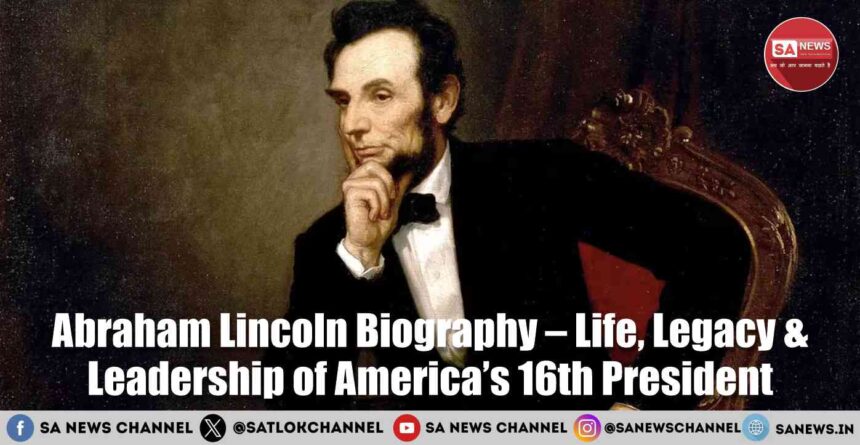Biography of Abraham Lincoln: Abraham Lincoln was the 16th president of the United States and is regarded as one of the most revered leaders in American history. He is best known for his role in leading the nation through the Civil War and for abolishing slavery. Lincoln’s journey from a small log cabin to the White House stands as a powerful and inspiring example of resilience and dedication. This biography explores his early life, political rise, presidency, personal beliefs, and enduring legacy.
Early Life and Childhood of Abraham Lincoln
Birthplace and Family Background
Biography of Abraham Lincoln: Abraham Lincoln was born in 1809, in a one-room log cabin in Hardin County (now LaRue County), Kentucky. His parents, Thomas and Nancy Lincoln, were farmers of modest means. Lincoln’s early life was marked by poverty and hard physical labor. He grew up in the frontier regions of Indiana.
Education and Early Hardships
Biography of Abraham Lincoln: Lincoln’s formal education lasted less than a year. However, he was a self-taught learner who read every book he could find. He was just nine years old when his mother died, a loss that left him devastated. His stepmother, Sarah Bush Johnston, encouraged his intellectual growth and played a significant role in his education.
Abraham Lincoln’s Rise in Politics
Early Political Career and Whig Party
Biography of Abraham Lincoln: Abraham Lincoln began his political career in 1830 when he was elected to the Illinois State Legislature, representing the Whig Party. At the same time, he worked as a lawyer and gained a reputation for honesty and sharp reasoning. He became popularly known as “Honest Abe.”
Formation of the Republican Party
Biography of Abraham Lincoln: By the 1850s, Lincoln had grown increasingly opposed to the expansion of slavery into new territories. In response to the Kansas-Nebraska Act of 1854, he joined the newly formed Republican Party, which stood firmly against the spread of slavery.
Senate Debates and National Recognition
Biography of Abraham Lincoln: Lincoln gained national attention during the Lincoln-Douglas debates in 1858. He challenged senior senator Stephen A. Douglas in a series of seven debates. Though he lost the Senate race, his eloquence and moral stance against slavery positioned him as a rising national leader.
Abraham Lincoln as the 16th President of the United States
Election Victory and Inauguration
Biography of Abraham Lincoln: Lincoln won the presidential election in 1860, becoming the first Republican to hold the office. His election triggered a crisis as multiple Southern states seceded from the Union, fearing his opposition to slavery. In March 1861, he took office in a nation on the brink of civil war.
■ Also Read: 8 Most Famous Historical Figures of the World
Leadership During the American Civil War
Biography of Abraham Lincoln: Shortly after Lincoln’s inauguration, the Civil War began. As commander-in-chief, he led the Union through its darkest hours. His strong leadership, powerful oratory, and deep dedication to national unity were instrumental in preserving the Union.
Emancipation Proclamation and Its Impact
Biography of Abraham Lincoln: On January 1, 1863, Lincoln issued the Emancipation Proclamation, declaring all slaves in Confederate states to be free. Though it didn’t immediately end slavery, it redefined the purpose of the war and laid the foundation for the Thirteenth Amendment, which abolished slavery permanently.
Personal Life and Values
Marriage to Mary Todd Lincoln
Biography of Abraham Lincoln: In 1842, Lincoln married Mary Todd, a well-educated woman from a prominent Kentucky family. The couple faced numerous personal and political challenges during Lincoln’s presidency. They had four sons, only one of whom—Robert Todd Lincoln—survived to adulthood.
Personal Beliefs and Moral Compass
Biography of Abraham Lincoln: Lincoln is remembered for his humility, empathy, and deep sense of justice. Although not religious in the traditional sense, his speeches often invoked spiritual and moral themes. He believed strongly in equality, fairness, and the principle of governance for the people.
Lincoln’s Legacy and Assassination
The Tragic Night at Ford’s Theatre
Biography of Abraham Lincoln: Just days after the Confederate surrender, Lincoln was assassinated by John Wilkes Booth, a Southern sympathizer. He was attending a play at Ford’s Theatre in Washington, D.C., on April 14, 1865, and died the next morning, April 15. The nation mourned deeply.
National Mourning and Impact on America
Biography of Abraham Lincoln: Lincoln’s death shocked the entire nation. Millions grieved the loss of the man who had preserved the Union and helped end slavery. His funeral train passed through several states before he was laid to rest in Springfield, Illinois. He became the first U.S. president to be assassinated.
Why Abraham Lincoln Remains a Timeless Icon
Influence on Democracy and Human Rights
Biography of Abraham Lincoln: Lincoln believed in the principle that “government of the people, by the people, for the people” should not perish. His efforts to uphold democratic values and fight for equality during a time of national crisis made him a global symbol of resilience, justice, and courage.
Memorials and Honors Dedicated to Lincoln
Biography of Abraham Lincoln: Lincoln’s memory is honored through numerous memorials, including the iconic Lincoln Memorial in Washington, D.C. His face appears on the U.S. penny and the five-dollar bill. His speeches—especially the Gettysburg Address and Second Inaugural Address—remain widely studied and quoted.
Lesser-Known Facts About Abraham Lincoln
His Love for Reading and Storytelling
Biography of Abraham Lincoln: Despite limited formal education, Lincoln was an avid reader who enjoyed history, literature, and philosophy. He was also known for his storytelling skills, often using humor and parables to make political points or ease tensions.
Lincoln’s Contributions Beyond Politics
Biography of Abraham Lincoln: Beyond politics, Lincoln helped modernize the U.S. economy through initiatives such as the National Banking Act, the Homestead Act, and the establishment of land-grant universities. These reforms laid the foundation for America’s growth after the Civil War.
Conclusion: The Enduring Legacy of Abraham Lincoln
Biography of Abraham Lincoln: Abraham Lincoln’s biography is not just a historical account—it’s a story of perseverance, vision, and dedication to justice. From a humble log cabin to the presidency, Lincoln’s life was driven by his commitment to equality and democracy. His leadership during the Civil War and his role in ending slavery secure his place as one of America’s greatest presidents. His legacy reminds us of the power of honesty, courage, and determination.
The Values and the Vision of Saint Rampal Ji Maharaj
Biography of Abraham Lincoln: The life of Abraham Lincoln, rooted in honesty, fairness, and a deep commitment to equality, aligns with the spiritual vision of Jagatguru Saint Rampal Ji Maharaj. Just as Lincoln fought for justice and human dignity in a divided world, Saint Rampal Ji Maharaj is guiding the world toward a divine society through the spiritual wisdom of Tatvagyan.
His teachings are based on scriptural truth and promote justice, integrity, and universal brotherhood. He envisions a world free from discrimination—where every soul is treated equally and guided toward peace, liberation from suffering, and ultimate salvation.









